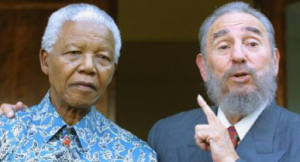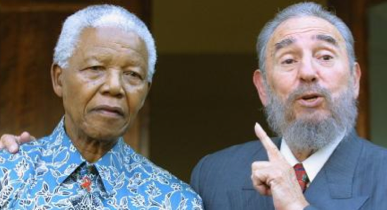It was the snub heard ’round the world.
More than two decades after international civil rights leader Nelson Mandela was rejected in Miami by Cubans who thought he  was too friendly with Fidel Castro, the same community mourned the former South African president’s death Thursday — though maybe not as much as they grieved his passing in other cities.
was too friendly with Fidel Castro, the same community mourned the former South African president’s death Thursday — though maybe not as much as they grieved his passing in other cities.
Mandela became a huge controversial figure here on his 1990 U.S. just-out-of-political-prison tour when he was not greeted with a red carpet welcome mat. There was no greeting party at the airport.
Then Miami-Dade Mayor Stephen Clark and Miami Mayor Xavier Suarez both boycotted his visit to the city because Mandela had thanked Castro for his support of the African National Congress and called the ruthless dictator a “brother in arms.” Suarez and Miami Commissioner Victor DeYurre withdrew their support for a proclamation welcoming him and praising his struggles because of Mandela’s endorsement of Castro.
“We can’t give any kind of recognition to that type of person,” DeYurre was quoted as saying.
Former Miami-Dade Commissioner and then West Miami Mayor Pedro Reboredo dared questioned Mandela’s creds as a political prisoner and compared him to the then-jailed anti-Castro activist Orlando Bosch. “Dr. Bosch is still in prison … while a supposedly oppressive country like South Africa freed a terrorist like Mandela,” Reboredo was quoted as saying.
Suarez, now a Miami-Dade Commissioner, told Ladra via text Thursday that Channel 7 showed “the proclamation with my signature” and that he did “object strongly” to Mandela’s characterization of Castro. Well, I’d say. Five days later, he and other local Cuban American leaders signed a letter to Mandela saying his words were “beyond reasonable comprehension.”
Still, Suarez, who is usually not this quiet about anything, didn’t want to talk about it.
“There was never a snub,” he told me via text.
But there is no doubt about it, Mandela’s visit here was politically polarizing.
Where he had been met in other cities with cheers and hugs and proclamations making it his day, the world’s most recognized icon of equality was met with jeers and boos by hundreds of Cubans who demonstrated outside the Miami Beach convention center where Mandela addressed labor union workers.
They held signs calling him a “communist” and a plane banner overhead called him a terrorist. Mandela had to go in through a back door to avoid the protestors and left the city immediately after, cancelling a rally in Liberty City on the advice of his security team. Instead of proclamations, political leaders issued demands that he repudiate Castro and take back his words, which Mandela never would. In fact, their relationship continued for many years and Castro visited Mandela in 2001.
Back in 1990, the NAACP and the national black community reacted with a tourism boycott of Miami that lasted three years, cost between $20 and $50 million, according to estimates and led to changes in diversity in the industry.
Thursday, after news that the Mandela had died, most of the local leaders were as quiet about it as they were on his visit. Miami-Dade Commission Chairwoman announced his death from a meeting Thursday — coincidentally to handle labor contracts — and called for a moment of silence.
But only Miami-Dade Mayor Carlos Gimenez and Commissioner Jean Monestime issued formal statement to the media in time for the late night news.
“I join members of our community in mourning the death of Nelson Mandela, who not only overcame great odds in his fight to abolish apartheid in South Africa but also became a global symbol of leadership,” Gimenez said.
Monestime was a little more emotional.
“President Mandela was a freedom fighter, a former prisoner and the symbol of the anti-apartheid movement, a Statesman, a peacemaker, an icon whose imprint on South Africa and the rest of the world will be felt for generations to come” Monestime said.
“Nelson Mandela was a tireless advocate for equality, dignity and human rights. He never flinched and never wavered in his struggle to bring equality for all the people of South Africa; so much so that he sacrificed his freedom so that others may gain theirs. Nelson Mandela’s place in history has long been cemented.
“Now he has taken his reserved placed in eternity next to his maker,” Monestime added. “South Africa lost a beloved son today, but the world grieves a modeled leader.
Former Hialeah Mayor Julio Martinez, who was in office at the time and passed one of those anti-Mandela resolutions and even stood in front of the convention center with a sign that said “If you love Castro, you don’t love democracy,” or something like that. He told Ladra Thursday that he would do it again today.
“I’m sorry that he died and he did a lot of good for his country. I only objected to a proclamation,” Martinez told Ladra. “He did a lot of great things for his country, but he said that Fidel Castro and Arafat were great men, when they are assassins and murderers. How can I accept that?
“He never recanted his words. And I stand by my words from 20 years ago,” Martinez said.
“I’m sorry that he died, but he didn’t have to endorse an assassin and a murderer.”
It’s possible that others who were around at the time of the infamous snub don’t want to remember that manchita in our history.
And it’s bad enough that it’s going to be reminded to us over and over and over in the next few days as Mandela’s legacy is documented in the media and Miami’s past intolerance — something that has, thankfully, since been diminished a great deal — is in the news again as part of his timeline.
You can’t rewrite history.

